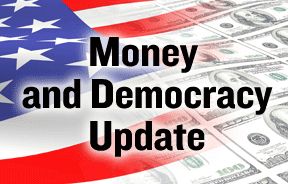Political party spending, mystery lawsuit funder, scandal in S.C. and more
 Stunning Statistics of the Week:
Stunning Statistics of the Week:
$3.43 million: Amount the Democratic Senatorial Campaign Committee raised in February
$3.34 million: Amount the National Republican Senatorial Committee raised in February
Limits on certain political party spending will stand, U.S. Supreme Court says
Limits on state and national political party spending as part of coordinated efforts to help party candidates will stand. The U.S. Supreme Court this week refused to hear a challenge to the limits by the Republican National Committee, the Republican Party of Louisiana and a former congressional candidate.
Candidates who use public money spend more time with voters
Candidates spend nearly 10 percent more time interacting with voters when they take public financing, according to a University of Illinois professor. This factoid is especially relevant given that the U.S. Supreme Court next week will consider the constitutionality of clean elections laws in McComish v. Bennett.
Mystery: Who is bankrolling lawsuit challenging foreign money ban?
Someone is paying for a pricey lawsuit that challenges the ban on candidates accepting foreign money for their campaigns. But the question is, who? The plaintiffs in the case are a young attorney and a medical resident. But the case is being litigated by high-powered attorneys, the kind that cost upwards of $440 an hour. Just so happens that a firm where the lawyers work, Jones Day, Warren Postman and Yaakov Roth, also represents Koch Industries and the U.S. Chamber of Commerce. The Chamber was accused earlier this year for comingling foreign money with its political spending account. Hmm.
South Carolina governor appoints 26 campaign donors to state posts
South Carolina Gov. Nikki Haley has appointed 26 campaign donors to state boards of commissions, the State reported. In all, they gave $74,703 to her campaign coffers.
Another way to get disclosure: Through the FCC
A public interest organization has petitioned the Federal Communications Commission to beef up its rules addressing disclosure of who pays for campaign ads. Currently, the agency requires the people or company that paid for the ad to be identified in the ad. If a company is paying for the ad, then the broadcast station must make publicly available a list of the company’s directors. The FCC does not require the company to say where its money comes from if the company says that it – not the donor – has editorial control of the ad. Media Access Project wants that changed so that major funders of ads are identified on air.ged.
Madison area residents get to vote on whether corporations are people
Madison, Wis., voters will have a chance to vote on whether the U.S. Constitution should be amended to state that “only human beings, not corporations, are entitled to constitutional rights.” That question will appear as nonbinding referenda on the ballots of the city of Madison and Dane County on April 5, thanks to the persistence of University of Wisconsin grad student Kaja Rebane.
Pro-business group that raised money for Chicago elections need not disclose funders
A pro-business group that has raised $855,000 for Chicago candidates does not have to tell the public where its money comes from, the state elections board has decided. For a Better Chicago, a political action committee, received the $855,000 from a nonprofit of the same name that is a 501 (c)4 group. Because those types of nonprofits don’t legally have to disclose donors, the PAC is in the clear. However, other groups won’t be able to execute this maneuver; a state law that took effect Jan. 1 caps the amount of money nonprofits can donate to PACs at $10,000.